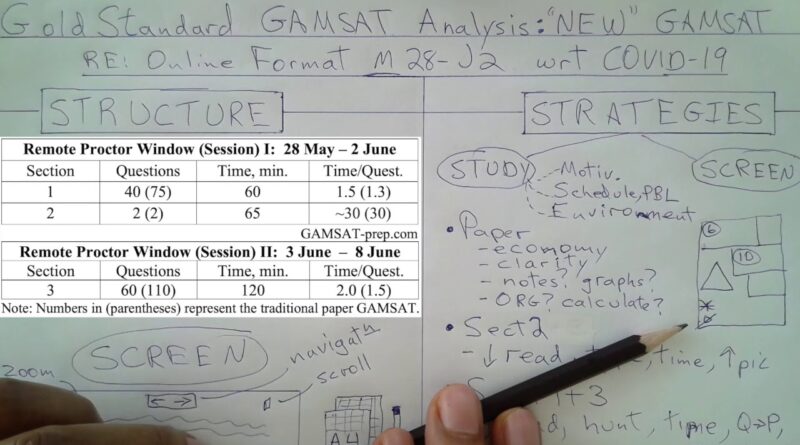Take a Look at the Difficulties in GAMSAT Preparation
One of the toughest challenges in becoming a medical practitioner is the Graduate Medical School Admissions Test, or GAMSAT.
This required exam, which measures applicants’ ability and critical-thinking skills, has long been seen as a difficult roadblock in the process of getting into medical school.
The GAMSAT preparation procedure is hard and difficult and calls for the development of not just academic knowledge but also advanced problem-solving abilities, time management, and mental fortitude.
Introduction to GAMSAT
It is essential to understand the purpose of this test before diving into the complexity of GAMSAT preparation.
Medical schools in Australia, the UK, and Ireland assess applicants’ eligibility for medical programs using the GAMSAT, a thorough evaluation instrument.
The GAMSAT does not evaluate memorization or factual knowledge, in contrast to other standardized examinations like the MCAT in the US.
Instead, it concentrates on evaluating the mental aptitudes and skills required for success in medical education.
Multidisciplinary Content
When studying for the GAMSAT, one of the first difficulties prospective medical students face is the test’s interdisciplinary structure.
Candidates are evaluated on this test in three key areas: written communication, biological and physical sciences, and humanities and social sciences reasoning.
These sections include a wide range of topics, including sociology, physics, and chemistry.
Candidates must therefore be knowledgeable in a variety of academic fields, making GAMSAT preparation a mentally taxing process.
Intensive Content Review
Candidates need to have a solid background in the scientific topics included in the Biological and Physical Sciences part of the GAMSAT to perform well on the test.
This necessitates a thorough understanding of difficult scientific ideas in physics, biology, and chemistry.
Related Article: Common Difficulties to Deal with in BMAT Preparation
It can be intimidating and time-consuming for prospective medical students to review topics they may not have studied in years.
Furthermore, the GAMSAT frequently assesses these topics at a level above that of college education, necessitating a better comprehension of the subject matter.
Critical Thinking and Problem Solving
Although academic background is crucial for GAMSAT preparation, it is not the only area of emphasis.
The test spends a large amount of time evaluating your ability to think critically and solve problems.
Candidates are given challenging scenarios and questions that demand them to critically examine data, reach logical conclusions, and do so in a limited amount of time.
These abilities are difficult to acquire and may need for months of diligent practice.
Time Management
For those who take the GAMSAT, time management is of utmost importance. There are several portions to the test, and each has a certain amount of time.

For instance, just 100 minutes are allotted for Section I, Reasoning in Humanities and Social Sciences, which leaves less than 1.5 minutes for each question.
Candidates have 60 minutes to finish two essay questions in Section II.
To increase one’s chances of answering every question on the 110-question biological and physical sciences portion, one must effectively manage their time.
It is a difficult challenge to manage time efficiently throughout the GAMSAT, and poor time management might result in unfinished portions and a lower total score.
Developing Writing Skills
The GAMSAT’s Written Communication part rates candidates on their written communication abilities and their capacity to effectively express ideas in writing.
Candidates are required to create compelling and well-organized essays in a condensed amount of time in response to two essay prompts presented in this segment on various subjects.
It can be difficult to develop good writing talents, thus many GAMSAT aspirants must put in a lot of work to do so.
Psychological Stress and Test Anxiety
The GAMSAT is a mental toughness test in addition to an academic evaluation. This high-stakes test’s pressure and tension can have a draining psychological effect.
GAMSAT test takers frequently struggle with test anxiety, which can negatively affect performance.
Stress levels may be increased by the dread of failure, the significance of the outcomes for medical school entrance, and the extensive preparation time.
Success on the GAMSAT depends on being able to control test anxiety and keep a calm, concentrated attitude, although this is frequently easier said than done.

Limited Resources and Practice Materials
For the GAMSAT to be well prepared for, access to excellent resources and practice materials is essential.
However, applicants frequently struggle to obtain thorough study resources, particularly if they are doing their own preparation.
Related Article: Which UK Medical Schools Require BMAT (Biomedical Admissions Test)?
Many materials for the GAMSAT are pricey, and not all applicants can afford them.
Moreover, it may be difficult for candidates to adequately assess their readiness due to the restricted supply of approved GAMSAT practice examinations.
Balancing Study and Other Commitments
Many prospective medical students prepare for the GAMSAT while also juggling obligations like job or other academic study.
It may be quite difficult to juggle the demands of GAMSAT preparation with other obligations. It calls for discipline, strong prioritization skills, and cautious time management.
Failure to achieve this equilibrium might result in exhaustion and subpar test performance.
The Cost of GAMSAT Preparation
Preparing for the GAMSAT is not only psychologically challenging but also expensive. The fees of studying, taking classes to prepare, and taking the test itself may mount up rapidly.
Furthermore, if a candidate is taking the GAMSAT at a test site that is far from their home, they may need to budget for travel and lodging.
For some people, the cost of GAMSAT preparation can be a considerable barrier, perhaps restricting their ability to pursue this course of medical study.
Limited Attempts
The GAMSAT has limitations on the number of attempts that are permitted, in contrast to several other standardized examinations.
Typically, candidates are only permitted to take the test a predetermined number of times within a predetermined window of time.
This restriction may increase candidates’ anxiety and stress levels since they may believe they have limited opportunities to get the appropriate score and be admitted to a medical school.
Final Verdict
The GAMSAT preparation process is difficult and complex, testing not only academic knowledge but also critical thinking, problem-solving skills, time management, and psychological fortitude.
A variety of challenges, such as the interdisciplinary material, in-depth content review, and the improvement of writing abilities, must be overcome by aspiring medical students.
They must also deal with the mental stress and test anxiety that frequently go along with high-stakes exams.
The difficulties are further exacerbated by a lack of resources, the necessity to juggle GAMSAT preparation with other obligations, and the prices.
Despite these challenges, many tenacious people continue because they are passionate about medicine and want to have an impact on the healthcare industry.
To successfully prepare for the GAMSAT and realize one’s aim of becoming a medical professional, one must ultimately be committed, diligent, and strategic.




